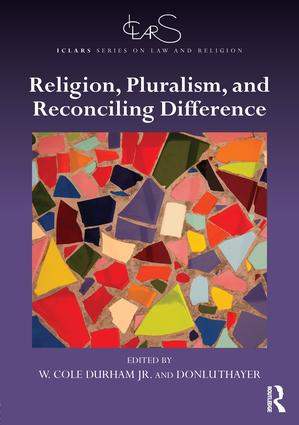Religion, Pluralism, and Reconciling Difference

Religion, Pluralism, and Reconciling Difference
W. Cole Durham, Jr. and Donlu D. Thayer, eds.
Routledge ICLARS Series on Law and Religion, 2019
We live in an increasingly pluralized world. This sociological reality has become the irreversible destiny of humankind. Even once religiously homogeneous societies are becoming increasingly diverse. Religious freedom is modernity’s most profound if sometimes forgotten answer to the resulting social pressures, but the tide of pluralization threatens to overwhelm that freedom’s stabilizing force.
Religion, Pluralism, and Reconciling Difference is aimed at exploring differing ways of grappling with the resulting tensions, and then asking, will the tensions ultimately yield poisonous polarization that erodes all hope of meaningful community? Or can the tradition and the institutions protecting freedom of religion or belief be developed and applied in ways that (still) foster productive interactions, stability, and peace?
This volume brings together vital and thoughtful contributions treating aspects of these mounting worldwide tensions concerning the relationship between religious diversity and social harmony. The first section explores controversies surrounding religious pluralism from different starting points, including religious, political, and legal standpoints. The second section examines different geographical perspectives on pluralism. Experts from North and South America, Europe, Africa, and the Middle East address these issues and suggest not only how social institutions can reduce tensions, but also how religious pluralism itself can bolster needed civil society.
CONTENTS
Introduction
1. The Paradox of Pluralism: Towards a Relational Approach to Religious Freedom – Russell Sandberg and Sharon Thompson
Starting Points
2. Human Rights and the Protection of Religious Expression: Manifestation of Religion as Lex Specialis of Freedom of Expression – H. Victor Condé
3. The Search for Pluralism in Islam, Roman Catholicism, and Judaism – Iain T. Benson
4. Religious Freedom and Pluralsim: A Judaic Perspective – Asher Maoz
5. Western ‘Civic Totalism’, Sovereignty of the People, and the Need for Limited Government – Hans-Martien ten Napel
6. From Rabat to Istanbul: Combating Advocacy of Religious Hatred that Constitutes Incitement to Discrimination, Hostility, or Violence – Mohamed Saeed M. Eltayeb
7. The Prohibition of Advocacy of Religious Hatred that Constitutes Incitement to Discrimination, Hostility, or Violence: A Taxonomy – Jeroen Temperman
Perspectives
8. Religious Pluralism: The Argentine Experience – Norberto Padilla
9. The Quest for Religious Pluralism in Post-Apartheid South Africa – Mary-Anne Plaatjies-van Huffel
10. National Human Rights Institutions and the Accommodation of Religious Diversity in Africa – Enyinna S. Nwauche
11. The Status of Religious Organizations in Poland: Equal Rights and Differentiation – Piotr Stanisz
12. State Neutrality and Religious Plurality in Europe – Javier Martínez-Torrón
Conclusion
13. Religious Pluralism: Peace or Poison? – W. Cole Durham, Jr. and Donlu Thayer
EDITORS
W. Cole Durham, Jr., Susa Young Gates University Professor of Law, Founding Director of the International Center for Law and Religion Studies, J. Reuben Clark Law School, Brigham Young University, USA; recurring Visiting Professor of Law at the Central European University in Budapest, Hungary; Co-Editor-in-Chief, Oxford Journal of Law and Religion.
Donlu D.Thayer, Publications Director, International Center for Law and Religion Studies, J. Reuben Clark Law School, Brigham Young University, USA; Associate Editor, Oxford Journal of Law and Religion.